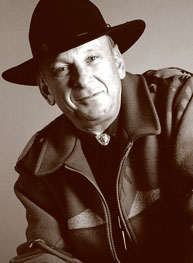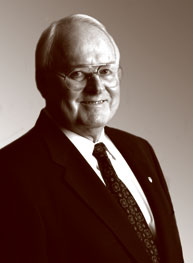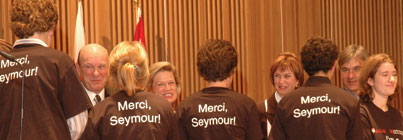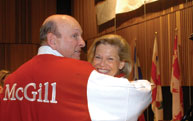Sharing the Wealth

Seymour Schulich

Marcel Desautels
McGill joins the name game in a big way as a music lover endows the Faculty of Management and an entrepreneur transforms the Faculty of Music.
When it comes to naming faculties, McGill is something of a johnny-come-lately among Canadian universities. With business schools especially, it's become customary - even expected - for the faculties to take on the names of generous donors who have enviable track records in the world of commerce.
Last fall, McGill caught up in a hurry.
On September 30, donning a tie decorated with musical notes for the occasion, Seymour Schulich, BSc'61, MBA'65, (shown at left) attended an event in celebration of his $20-million donation to McGill's Faculty of Music - the largest personal contribution towards a university-based arts program in Canadian history. In recognition of the gift, the faculty was rechristened the Schulich School of Music.
Less than two months later, the press was again assembled for a similar announcement, this time involving the Faculty of Management. Marcel Desautels, (above) president and CEO of the Canadian Credit Management Foundation, was in the spotlight as another philanthropic record was established. Desautels and the CCMF donated $22 million to McGill, the biggest gift ever made to a business school in Canada. Another new moniker made its debut - the Desautels Faculty of Management.
In business circles, Seymour Schulich is known as a blunt and plain-spoken man with a playful streak - friends mention his fondness for Western gear and cowboy collectibles. A canny investor throughout his business career, Schulich chooses the beneficiaries of his philanthropy carefully. He is determined to get bang for his charitable bucks.

Seymour Schulich in his student days, busting some moves at the Winter Carnival dance
"With all the due diligence you have to do to make sure your gift accomplishes what you want it to do," Schulich told Canadian Business, "it's easier making the money than giving it away."
Named to that magazine's annual listing of the 100 wealthiest Canadians, Schulich added, "There are quite a few people on your rich guys list who aren't pulling their weight."
He was quick to return to the subject in a recent interview with the News. "Canadians give 44 percent less per capita than Americans. Why should that be?"
Schulich was born in Montreal to a family of modest means and his father, who had lived through the Depression, raised his son to manage his money prudently. Schulich says he is still careful about switching off the lights when he exits a room.
It was a series of factory jobs in his youth, though, that really gave Schulich the determination to succeed in the business world. "Summer jobs spent in glass or box factories let me know if I didn't smarten up that would be my fate."

McGill's New Music Building
He became the first in his family to attend university, earning a bachelor of science from McGill in 1961. He added an MBA as a member of the McGill program's first graduating class in 1965. Yet without a $1,600 scholarship from Bache & Co. he says his business degree would have been out of reach. "That scholarship changed my life."
He hopes to do the same for others. Most of his gift to the Faculty of Music will be used to create 40 renewable scholarships worth $10,000 per year for graduate students and $5,000 per year for undergraduates. He has now created 400 scholarships at universities across the country.
"Scholarships are a better option to loans wherever possible," believes Schulich. "Students should not have to graduate with debt."

Some new Schulich scholars thank the man who made it possible. With Seymour and Tanna Schulich are Principal Heather Munroe-Blum and Quebec Education Minister Jean-Marc Fournier
"The impact of Seymour Schulich on higher education is huge," marvels Dean of Music Don McLean. "Over the next 100 years, his combined gifts will have enabled 20,000 students across Canada to obtain Schulich Scholarships. That's enough people to fill McGill's Molson Stadium."
One wonders if any of the students will use the funds quite as creatively as Schulich did. Offering a glimpse of the businessman he was to become, Schulich didn't just deposit his scholarship money in the bank. He made a series of shrewd investments, doubling its worth. After paying off school expenses, he had enough left over to finance a three-month stay in Europe.
Emeritus professor of management Donald Armstrong remembers his former student well. "Everyone in the program knew that Seymour was a whiz kid at finance." Armstrong says Schulich remained grateful to his alma mater, returning on occasion as a guest lecturer. "During a talk to one of my classes, a student asked if the real world wasn't a better place to learn business than an MBA," Armstrong recalls. "Seymour said, 'The real world is an expensive place to get a management education. Your MBA will be the best and the cheapest way of reducing your losses as you begin your struggle with the real world. The more knowledge and skills you can acquire now, the more you will avoid costly mistakes later.'"

Sculich with wife Tanna at the building's official opening
Schulich attended the University of Virginia for his next degree, training to become a chartered financial analyst. After serving as a fund manager for various firms, he accepted a job in Toronto with Beutel Goodman & Co. There he met fellow Quebecer Pierre Lassonde, with whom he launched a small mining business, Franco-Nevada, in 1982. Lassonde's French roots provided the first half of the name, the U.S. state where their firm operated supplied the other half.
A talented poker player, Schulich jokes that he and Lassonde had ulterior motives when they created a company centred in Nevada. "Success in business came from our desire to write off skiing and poker trips."
Whatever their motivation, Schulich and Lassonde were pivotal players in creating the world's largest gold producer when they convinced the Newmont Mining Corporation to take over not only Franco-Nevada, but an Australian mining company as well. When the dust settled, Franco-Nevada's stake in Newmont was valued at $3 billion.
As a result of his philanthropy, Schulich's name now looms large in Canadian higher education. York University's Schulich School of Business, the University of Western Ontario's Schulich School of Medicine and Dentistry and the University of Calgary's Schulich School of Engineering are all testaments to his dedication to universities.
"By giving to four disciplines across the country - management, medicine, engineering and music - Seymour has created one virtual university," says Alvin Libmin, an Alberta-based friend who played an important role in convincing Schulich to support the University of Calgary's efforts in engineering.
McGill's Don McLean remains amazed by his school's good fortune. "People are simply not writing cheques like this for culture." Schulich himself notes that his previous donations to universities went to decidedly different areas. "Most of my prior gifts were for practical, hard-core programs."
Schulich credits Joe Sorbara, a Toronto real estate developer and director of the Toronto Symphony, with convincing him to make the gift with six simple words: "Music is what makes us human."


